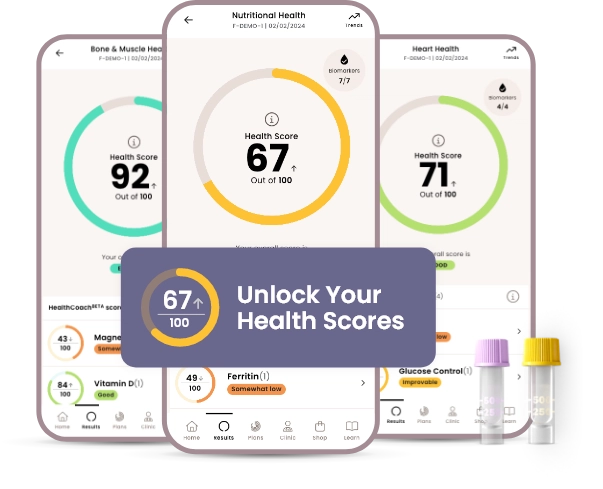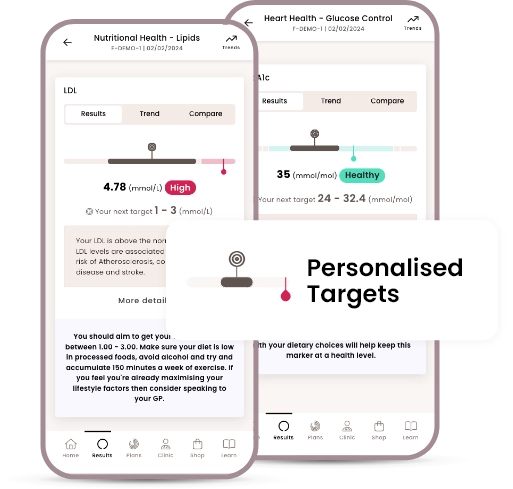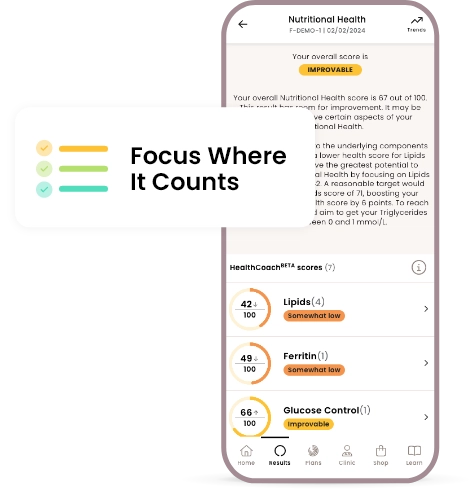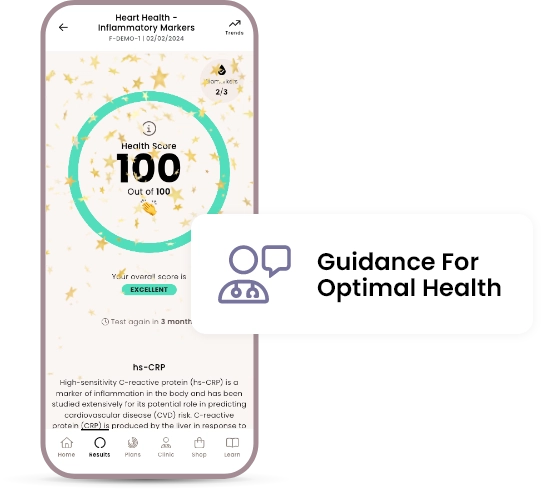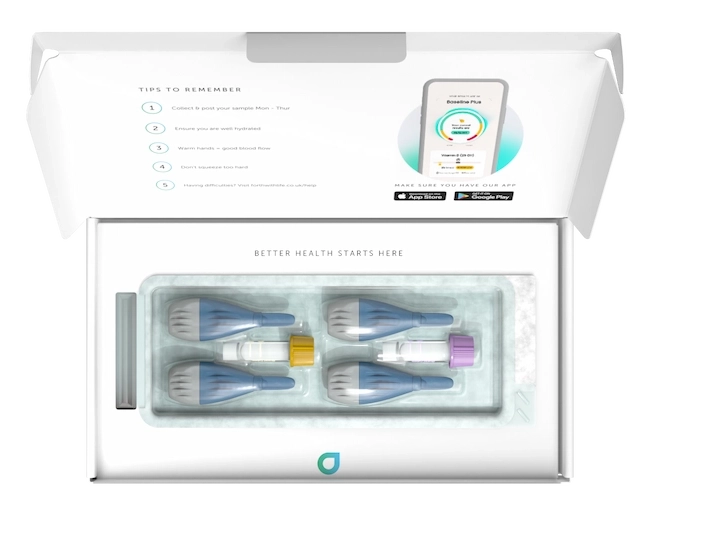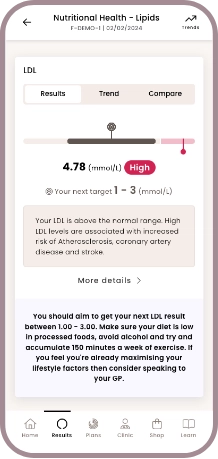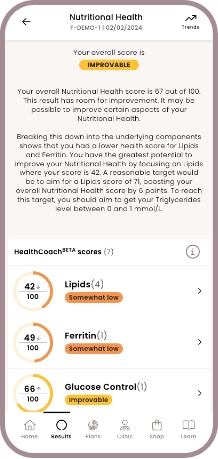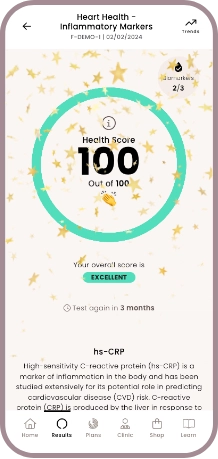About flexible subscriptions
How does a subscription work?
When you purchase this test subscription plan, we will automatically send you another test kit in a few months. Don't worry - you have full control over when this will be, and you can change/cancel it anytime.
When you first purchase this test, you can choose your subscription options in the checkout. We do this, because we recommend taking multiple tests over time to track how your biomarkers change. You'll be charged per test kit (rather than monthly, for example).
Why subscribe to multiple tests?
One test will show you what areas you need to focus on, continued testing will help you learn how your training, diet and lifestyle is impacting your health.
How often should I test?
We recommend a follow up test 3 months after your first test, followed by a test every 6 months depending on your results, but its up to you!
Can I change what's tested in future tests?
Yes, you can tailor/customise subsequent tests (via your app) to focus on just the areas that need improving.
Baseline Health Check
£115
Per test
The Baseline Health Check is a great way to get a snapshot of your overall health and wellbeing. It's an at-home blood test that provides insights into some of the most essential health markers including bone health, heart function, liver function, and energy levels.
Validated & analysed by NHS Lab
Tracked 24 delivery
Finger prick or venous collection
Results in 2 working days
Flexible subscription
Shop now. Pay over time with Klarna
Klarna available at checkout.
Klarna's Pay in 3 / Pay in 30 days are unregulated credit agreements. Borrowing more than you can afford or paying late may negatively impact your financial status and ability to obtain credit. 18+, UK residents only. Subject to status. Ts&Cs and late fees apply.
What gets tested?
25 Biomarkers
Blood sample collection options
How does it work?
When do I take the test?
Collect your blood sample within 3 hours of waking and before food.
Certified for quality & security
Blood sample collection options
You can choose your preferred collection method when you checkout
Finger prick kit (FREE)
You can do this test at home without the need for a doctor. We'll send you everything you need to collect your sample and post it back to us. And it's all included in the cost. We've put together a video that covers the process, making it easy to check and track your health from home.
Home nurse appointment (+£60)
We'll arrange for a medical professional to visit your home and collect your sample. This is great if you're unsure on how it all works or have trouble collecting a sample. No need to book a doctor's appointment or visit a clinic, we'll send you everything you need to collect a sample and post it back to our labs.
Visit a partner clinic (+£45)
Once you've ordered your test, look out for an email from our phlebotomy partners containing information and a link to book your appointment. We'll send you everything the clinic will need to complete the sample and post it back to our labs.
Organise a nurse myself (FREE)
If none of the above options work for you, you can arrange your own medical professional to collect your sample. There is no additional charge for this. Once you've ordered your test, we'll send you everything you and your chosen medical professional will need to collect a sample and post it back to our labs.
Still unsure how it works? You can find more information on collection methods and the service we provide in our 'How it Works' section.
How does it work?
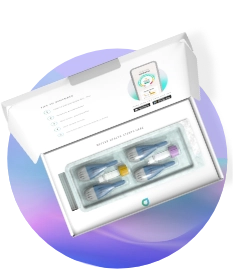
1. Choose your blood test
No need to wait for a GP appointment, your kit will arrive within 1-2 days, which includes everything you need to collect your blood sample and post it back to our labs.
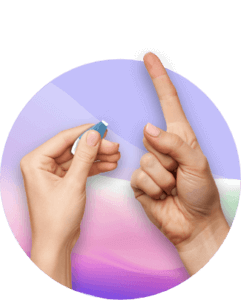
2. Collect your sample
Take your finger prick blood sample at home, or choose to have your blood taken at a Superdrug health clinic or a nurse at home. Return to our NHS lab using our prepaid envelope.
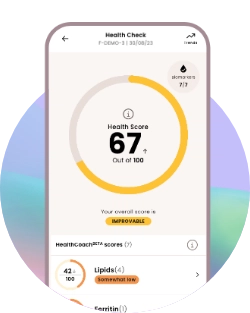
3. View your results
View your results on your secure health dashboard within 2 working days of our lab receiving your sample. Read personalised comments from our GPs.
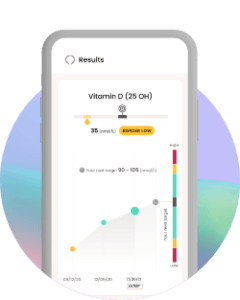
4. Make improvements
With more in-depth results, you will be able to identify areas that need improving. Make the changes and track your progress.
What gets tested?
25 Biomarkers Included
- Active B12
- Alanine Aminotransferase (ALT)
- Albumin
- Alkaline Phosphatase (ALP)
- Corrected Calcium
- Creatine Kinase
- Ferritin
- Testosterone (Total)
- Gamma GT
- Globulin
- Haemoglobin
- HbA1c
- HDL (high-density lipoprotein)
- HDL Ratio
- hs-CRP
- LDL
- Magnesium (serum)
- Oestradiol (Oestrogen)
- Red Blood Cell (RBC)
- Total Cholesterol
- Total Protein
- Triglycerides
- Uric Acid
- Vitamin D (25 OH)
- White Blood Cell Count (WBC)
Additional biomarkers can be added by personalising this test.
What are biomarkers?
Biomarkers are specific compounds we can detect in your blood sample that reflect different things about your health. Your test will tell you your levels for each of the above biomarkers, and whether they are in a normal range.
Unlock your health scores with HealthCoach™
Powered by cutting-edge technology, Forth’s industry leading app goes beyond reporting basic biomarker results and one-size-fits-all health advice to deliver a comprehensive roadmap to better health.
Your Baseline Health Check will give you the following Health Scores
Nutritional health
Immune health
Liver health
Heart health
Bone & muscle
What is a baseline blood test?
A baseline blood test is a general check of your health. Our Baseline Health Check looks at 25 key health markers related to your heart health, muscle and bone health, liver function, energy levels and nutritional health, giving you deeper insights into your overall wellbeing.
What can a baseline blood test detect?
A baseline blood test or general health check can detect a range of illnesses by checking high or low levels of hormones, vitamins and other markers. It could detect high cholesterol (which can cause heart disease), by checking your HDL and LDL levels, along with HDL ratio. You may also be able to understand the cause of symptoms such as low energy and fatigue (B12, Ferritin and Vitamin D), as well as, diabetes (HbA1c).
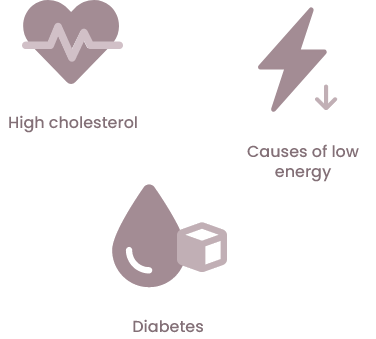
Do I need a baseline blood test?
If you’re curious about your health or want answers to why you feel a certain way, a baseline blood test is for you. Our doctors will be able to give you advice on how to improve your overall health once you’ve done the test such as changing your diet or taking supplements for deficiencies.
Frequently asked questions
This is what our customers ask us most about this test. For more information, try our help centre.
How can I improve my health?
Too often we take our health for granted, ignoring the fundamental areas of health that we should all be tracking and managing. The Baseline Health Check uses biomarkers across cholesterol, essential vitamins, hormones, HbA1c (average blood glucose), bone health, heart health, and liver & kidney health – allowing you to understand key biomarkers that are essential to spotting areas of risk and improvement.
The average individual can optimise their health by eating a balanced diet low in ultra-processed foods, exercising, getting plenty of sleep and recovery, reducing their alcohol intake, and quitting smoking.
What vitamins are good for my health?
The following vitamins are good for your health:
- Vitamin A – keeps your heart, lungs, and other organs functioning well
- Vitamin B complex – these vitamins help to convert proteins, fats, and carbohydrates into energy
- Vitamin C – is essential to a correctly functioning immune system and aids in iron absorption
- Vitamin D – is essential to bone health and a well functioning immune system
- Vitamin E – helps to prevent blood clots, and ensures a well functioning immune system
- Vitamin K – is essential to bone health and blood clotting
- Calcium – ensures good bone health and teeth
- Iron – essential for the healthy production of blood cells
- Magnesium – is used in the formation of many enzymes
- Zinc – is vital to immune health, normal growth, and development during pregnancy
What foods are good for my health?
Diet plays an important role in our general health – we are what we eat. It is important to eat a balanced diet low in ultra-processed foods. Great diets – and great tasting include:
- mediterranean diet
- vegan diet (ensure you get all the vitamins and minerals you need)
- low carb, whole food diet
- gluten free diet
- paleo diet
Can my physical health impact my mental health?
Your physical health has an important impact on your mental health from feeling good about your physical appearance, having good energy levels, and ensuring your vitamins, minerals and hormones are well balanced to boost your mental health and quality of life.
How does the subscription work?
When you purchase this product you will be given the option to sign up to a subscription every 3, 4, 6 or 12 months. Your next test will then be sent out automatically and your payment card will be billed. You can manage your subscription through your own personal dashboard where you view your results. You can change the frequency or cancel the subscription at any time.
Important information regarding corrected calcium
Our labs have conducted stability validation on all the markers offered by Forth. Corrected Calcium has a shorter stability time than the majority of markers of around 2 – 3 days. Forth provides a Tracked 24 return envelope in all kits to return samples to the lab within 24 hours. In the majority of cases, samples are returned within the stability time. If a sample arrives outside this time, this result will not be provided to you.
How soon will the test arrive?
If you order your test before midday on a Monday to Friday then your kit will be dispatched
the same day.
All our kits are sent out via Royal Mail first class post, so it should be with you within 1-2
working days.
How secure is my data?
We have strict processes in place to ensure the protection of your data. Following GDPR the company also operates under tight legal rules about the sharing of data which ensures that data is only shared if it is crucial to the delivery of our service. For example, our doctors see customer results at the time of review, however, after review, access to results is withdrawn.
Learn more about your data security.
Can I have someone take my blood for me?
Yes. We offer two options if you do not want to do our finger prick test. The first is a home appointment where a nurse comes to your home to take a blood sample. The second is to visit a Phlebotomy clinic near you that offers a blood sample service.
A blood sample will be taken from your vein and we will provide you with everything you need to give to the nurse to allow them to take the sample.
The nurse will give you the blood sample to return to us using the pre-paid envelope provided.
Does a doctor review my results?
We have a team of doctors and nurses who look at all results and will comment on any results that are outside of the normal range for your age.
Can I download the results to share with my GP?
Yes, you can download your results from your health dashboard as a PDF to share with your GP.
Learn how to export your results.
We are dedicated to supporting you on improving your health
Go to help center
Baseline Health Check, recommended by our doctors
"A Baseline Health Check is a proactive step toward well-being. It provides a broad view of your health, detecting early signs of potential issues, such as heart disease, diabetes, or nutritional deficiencies. This knowledge empowers you to take timely actions, leading to better health, peace of mind, and a longer, more vibrant life."
Dr Thom Phillips
Similar tests
- Health scores calculated
Close
We're changing people's lives
How our Baseline Health Check works
Getting the insights you need to improve your health has never been easier.

1. Choose your blood test
No need to wait for a GP appointment, your kit will arrive within 1-2 days, which includes everything you need to collect your blood sample and post it back to our labs.

2. Collect your sample
Take your finger prick blood sample at home, or choose to have your blood taken at one of our partner clinics or a nurse at home. Return to our NHS lab using our prepaid envelope.

3. View your results
View your results on your secure health dashboard within 2 working days of our lab receiving your sample. Read personalised comments from our GPs.

4. Make improvements
With more in-depth results, you will be able to identify areas that need improving. Make the changes and track your progress.
What's included in this test?
This is a subscription package which you can cancel at any time via your Health Dashboard. You can choose how often you’d like to receive a new test kit by selecting 3, 4, 6 or 12 months during checkout. Pause or change the frequency to suit your needs.

1x Yellow Tube
1x Purple Tube
4x Lancets

1x Cleansing wipes

Plasters

2x Alcohol swabs
1x Return pouch

1x Tracked 24 return envelope

1x Lab request form
Blood sample kit
Results within 2 working days
Tracked 24 delivery & return
Secure health dashboard
Accredited lab analysis
Doctor reviewed results
Our impact in numbers...
70+
From hormones to nutrients, we offer 70+ different tests
60,000+
We've helped over 60,000 people improve their health
800,000+
We've delivered over 800,000 test results
Related articles
Like this article? Here are some more based on similar topics.
Flexible subscription, cancel anytime
Baseline Health Check

